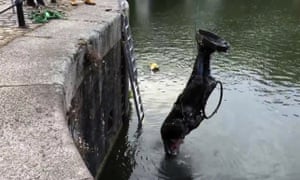Ben Quinn @BenQuinn75 Wed 17 Jun 2020 16.24 BST Last modified on Fri 19 Jun 2020 16.04 BST Shares 99 T...
A descendant of Edward Colston has written to Bristol’s mayor to suggest ways of “making peace with the past” such as twinning Bristol with cities in west African countries most affected by slavery
Philip Colston Robins, a former university dean and Treasury civil servant, told the Guardian he was disappointed that a peaceful demonstration with “a moral cause” had descended into an “unruly mob”, after Black Lives Matter demonstrators toppled Colston’s statue in the city.
Demonstrators attached a rope to the Grade II-listed statue of the slave trader on Colston Avenue and pulled it to the ground as crowds cheered.
They then jumped on it and rolled it down the street before pushing it into Bristol Harbour. It has been retrieved and Bristol city council has said it will eventually be housed in a museum.
Robins said he had written to Bristol’s mayor, Marvin Rees, to outline suggestions for how developed countries can make “peace with the past” by recognising their moral obligations to provide development aid to countries most affected by the slave trade.
“It should be inclusive, positive and forward-looking. We should look to bring reconciliation and through the work of these projects redemption as well. A better reaction to the past than statue toppling and worse.”This could be through a “Colston development foundation” in the case of Bristol, which he said could “lead the way” and should be twinned with cities in west Africa.
He said Rees “could do his bit by leading Bristol in a way that extends the hand of reconciliation to those places in Africa that suffered most from the slave trade, as well as encouraging the government to act and to do its bit to prevent further social disunity”.
Asked how he felt about the toppling of the statue, he replied: “I think it is one of disappointment. Disappointment that a peaceful demonstration, with a moral cause, should descend into an unruly mob with anger and resentment spilling over, made worse by the disingenuous response of the government of calling for another inquiry.
“The other part of the disappointment is that many, perhaps most, taking part in the Bristol demonstration relied on social media to inform them about the wickedness of Edward Colston,” said Robins.
“He may not have been a personally attractive character and he kept bad company but the evidence that he was the biggest player in the slave trade out of Bristol is lacking. He was rich from fruit, wine and cloth-trading, money-lending and his investments but linking this wealth to his involvement in the slave trade is hard to do.
“He is a convenient target on which anger and frustration can be vented, at the expense of understanding, and with the folly of judging others, in a different time, by our standards – which are evidently so superior to theirs.”
In the US, a lawyer in North Carolina who advocates for fair elections and believes that her family are also linked to Edward Colston expressed her approval for the toppling of the statue.
Aylett Colston also told the Guardian: “More importantly, however, I think that all ‘white’ Americans have a duty to confront and change systemic racism in America regardless of their particular ancestry.
“Racism is a societal problem, so it must be addressed by society. Racial inequity is not caused by ‘a few bad apples’ with ‘hate in their hearts’. Truly achieving racial equity in America will take systemic change, and it is the solemn obligation of all Americans to make that change.”
With those in power failing us …
… at this historic moment, we demand better. From the covid pandemic and police brutality to the marginalisation of minority communities around the world, leadership is broken. Lacking sensitivity to the real lives of their people, leaders are gambling with public health, safety, community cohesion and the future of younger generations. Divisive and poor at crisis management, they sometimes appear more interested in serving themselves over the people they were elected to serve. We have to make them raise their game.
That’s what the Guardian’s here for. As an open, independent news organisation we investigate, interrogate and expose the incompetence and indifference of those in power, without fear. Our journalism is free from political and commercial bias – this makes us different. We can give a voice to the oppressed and neglected, and stand in solidarity with those who are calling for a fairer future. With your help we can bring about improvement.
Millions are flocking to the Guardian for quality news every day. We believe everyone deserves access to information that is fact-checked, and analysis that has authority and integrity. That’s why, unlike many others, we made a choice: to keep Guardian reporting open for all, regardless of where they live or what they can afford to pay.
We’re determined to provide journalism that helps each of us better understand the world, and take actions that challenge, unite, and inspire change – in times of crisis and beyond. Our work would not be possible without our readers, who now support our work from 180 countries around the world.
But news organisations are facing an existential threat. With advertising revenues plummeting, the Guardian risks losing a major source of its funding. More than ever before, we’re reliant on financial support from readers to fill the gap. Your support keeps us independent, open, and means we can maintain our high quality reporting – investigating, disentangling and interrogating.








COMMENTS